By: Prof. Dr. Walid ‘Abd al-Hay.[1]
(Exclusively for al-Zaytouna Centre).
Introduction
Without delving into the jurisprudence of the English language, normalization in its political sense means “returning to the normal state in the relationship between political entities,” which assumes that the origin in international relations is peace rather than conflict. It is an assumption not recognized by many philosophers in this field like the Hegelian or Marxist perspective in the dialectical aspect, or the perspective of the philosopher Thomas Hobbes, or the Darwinian perspective, or the perspective of the clash of civilizations as expressed by Samuel Huntington, or the Islamic perspective in its understanding of civilization. It is also not endorsed by the realistic Western theory in international relations in its two parts, the old (Hans Morgenthau and Reinhold Niebuhr) and the contemporary (Kenneth Waltz). Even the concept of “peace” has two directions: “positive peace” which includes the absence of all forms of direct or organic violence, and “negative peace” which means the absence of all forms of indirect violence, especially structural violence.[2] The latter peace has been lived daily by the Palestinians, where the Palestinian refugee has been surviving for decades in unfavorable political, economic and social conditions that do not correspond to the normal situation in which other peoples live; or when the Palestinians are kept subject to occupation that has not been approved by any state or international organization; or when the Palestinian farmer is prevented from exploiting his land and uprooting him to replace him with settlers. Here, it is necessary to distinguish between the moral perspective of peace, as put forward by Immanuel Kant in the project of Perpetual Peace, and the peace which is one of the tactics of conflict management mechanisms, which brings us back to the concept of negative peace and the practice of structural violence.[3]
| Click here to download: >> Academic Paper: The Motives for Arab Normalization with Israel from the Perspective of the Society, the State and the Political System … Prof. Dr. Walid ‘Abd al-Hay |
This means that normalization is a vague concept, as the normal state of humanity is not agreed upon (conflict or peace), and it is sometimes part of the conflict management. Furthermore, absenting the concept of negative peace is worth of attention, where it may be covered by normative literature as part of conflict management, without forgetting that the psychological perspective of Freud and a wide group of thinkers believe that man includes in his psychological structure both peaceful and aggressive tendencies, as evidenced by the Einstein-Freud correspondence.[4] It suffices to point out that the psychological damage to which the refugee is exposed,[5] as is the case with the Palestinian refugee, is not less than the material damage that occurs due to confiscation, occupation or destruction during war. Therefore, the compensation for these damages (if we assume accepting normalization) exceeds in some cases compensation for material losses, as happened with the refugees of various countries after World War II.[6]
The above paves the way for asking the question of our study: Did Arab normalization with Israel produce results that promote “peace” within each of the countries of normalization or promote “peace” at the regional level? Or did it present a model for “peace” that the rest of the world’s parties to disputes and conflicts can emulate? We will try to identify the main motive for normalization on the Arab side according to the results of the analysis.[7]
Answering these questions is based on three criteria:
1. Using the quantitative method for measurement: We addressed four main indexes: political stability (which has 50 sub-indicators in our model), democracy (which has five sub-indicators), military expenditure as a % of Gross Domestic Product (GDP), and research and development (R&D) expenditure as a % of GDP. This means that the measurement here is based on 57 sub-indicators covering the economic, political, social and scientific aspects besides measuring the improvement and decline of the main indicators due to the normalization of nine Arab countries with Israel.
2. Using the normalization index based on the countries that legally recognize Israel or have established any commercial, sports, cultural or official contacts with Israel, and this contact continued, albeit in different forms and at different levels. This includes nine Arab countries; Egypt, Jordan, Morocco, Sudan, UAE, Qatar, Oman, Saudi Arabia (KSA) and Bahrain.
3. We acknowledge at the outset that development or regression in any aspect of Arab international relations is not dependent on normalization alone, but what is important in our discussion is to determine the impact of normalization in enhancing the Arab condition, which is why normalization was pursued in the first place.
Application
First: Political Stability Index[8]
Political stability is one of the most important indexes of the general development of any country or society, as stability is determined by economic variables (Gini index, which measures the extent to which the distribution of income among individuals or households within an economy deviates from a perfectly equal distribution; economic growth; or unemployment rates); political variables (political violence like assassinations, civil wars, continuous change in government departments, society tension such as between minorities, sects or any sub-identities, or the degree of military intervention in power and government work); social variables (education, gender discrimination or crime); or other indicators such as regional disturbances and their impact on near states, or global environment changes.
The political stability index is based on a model established by Kauffmann and then was developed, where the scale starts from 0 to +2.5 (strong stability), and from 0 to –2.5 (weak stability). We have used a specific scale which is that of TheGlobalEconomy.com[9] with the use of other measurement indicators to adjust the results, and we did not find a statistically significant difference compared to other measurement models,[10] which enhances the results of our measurement.
The measurement revealed, as evidenced by the graphs of the countries under study, that the normalization countries experienced a decline in political stability by an average of 0.78 points in six countries, and an improvement in three countries at an index of 0.70, noting that the six countries in which the stability index declined represent about 52% of the Arab world population and these are Egypt, Jordan, Morocco, Sudan, KSA and Bahrain. However, the countries with improved stability represent only about 4%,[11] and these are the UAE, Qatar and the Sultanate of Oman. This means that the Political Stability Index in the nine countries that represent 56% of the Arab world population declined by about 0.08 points, which is higher than the 0.07 global decline rate of 2021–2022.
1. Egypt
The political stability index of Egypt throughout 1996–2021 has remained in the negative zone (the state of instability), and the highest degree of instability was around 2013. However, the gradual improvement did not enable Egypt to leave the group of “unstable” countries, which means that normalization for Egypt, which established relations with Israel since 1979 (44 years ago), did not move the country to any positive level of stability and the lowest levels of instability were recorded after normalization reaching –1.02 in 2022 (meaning 40.8%).
Chart 1: The Political Instability in Egypt after Normalization
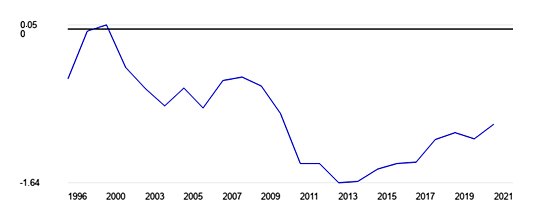
2. Jordan
Normalization between Israel and Jordan began in 1994. Since that year until 2005/2006, political stability declined within the negative region then continued to fluctuate without leaving the negative zone reaching –0.28 in 2022.
Chart 2: The Political Instability in Jordan after Normalization
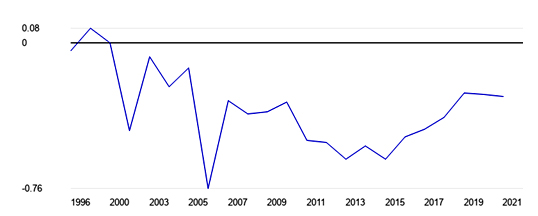
3. Morocco
Moroccan-Israeli relations go back to the period after the victory of the Algerian revolution and the outbreak of conflicts between Morocco and Algeria in the 1960s. Yet, declared and official normalization began after, and the trend of instability began in Morocco at the end of the 1990s, so stability declined from +0.31 to –0.4, which means a clear deterioration as shown in the following chart.
Chart 3: The Political Instability in Morocco after Normalization
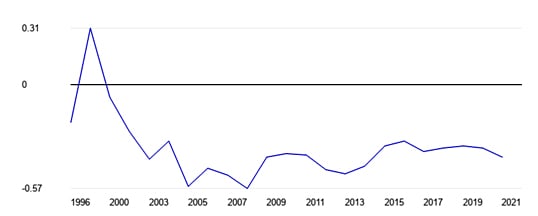
4. Sudan
Sudan has not left the negative region of political stability index since the mid-1990s, and it continued to fluctuate to reach the lowest levels of instability in 2008/2009, then it began to improve (became less bad), but it relapsed directly with the military coup in 2019 led by ‘Abdel Fattah al-Burhan, who met Israeli Prime Minister Benjamin Netanyahu in Uganda ten months after the coup. Political Stability index reached –1.94, which is the worst among normalization countries, although al-Burhan justified normalization saying, “I took this step from the standpoint of my responsibility… to protect the national security of Sudan and achieve the supreme interests of the Sudanese people.”[12] It is certain that instability has greatly increased after the current confrontations between the army and the Rapid Support Forces, meaning that the relationship with Israel did not contribute in any way to improving stability in Sudan despite the relationship of the two Sudanese parties with Israel.[13]
Chart 4: The Political Instability in Sudan after Normalization
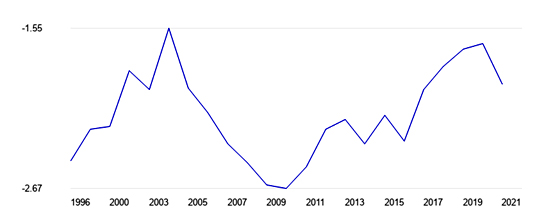
5. United Arab Emirates
Comparing the period of the mid-1990s and the current period 2022 shows sharp decline in the UAE Political Stability Index, but the period 2015–2019 witnessed a gradual improvement (while remaining among the stable countries). Yet, the period 2020 until now, that is, after the Emirati recognition of Israel and the conclusion of the Abraham Accords, saw improved political stability. Nonetheless, the general trend of political stability in the UAE over the past 28 years has fluctuated and the improvement in the period after the recognition of Israel is a continuation of the track before it. This makes the role of recognition in the improvement part of the ongoing volatility, not to mention that political stability was better in the pre-normalization period.
Chart 5: The Political Instability in UAE after Normalization
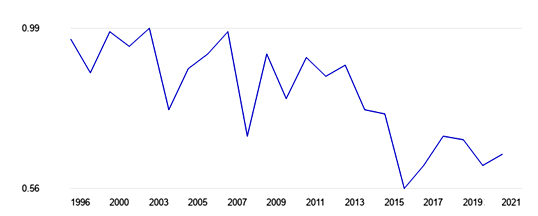
6. Qatar
Qatari commercial relations with Israel began in 1996, after the opening of an Israeli commercial office in Qatar and frequent visits and meetings between Qatari and Israeli officials, besides allowing Israeli sports teams to participate in sports competitions and allowing the Israeli public to attend Doha stadiums as in 2022.[14]
The Qatari Political Stability has remained, like the UAE, in the positive zone. It clearly increased with the rapprochement and meetings with Israel after 1996, but declined after 2016 (without leaving the positive zone), and improved since 2019 reaching +0.96 at the end of 2022. But this level is lower than +1.22 reached in 2011/2012, which clearly puts it among the stable countries. However, it is difficult to link this improvement during that period to any fundamental change in the Israeli-Qatari relations, as while Qatar was calling for an investigation into the actions of Israel in Jerusalem, the Qatari-Israeli trade was improving despite the fact that the total value of this exchange was very marginal and did not reach one million dollars, according to the Israel Central Bureau of Statistics.[15] Despite the intensification of the conflict between the Palestinians and the Israelis in 2008/2009, the visits and meetings between officials from Qatar and Israel did not stop, and the 2008/2009 period was among the highest periods of political stability in Qatar, meaning that the Israeli behavior against the Palestinians was not reflected on the political stability in Qatar, and Israeli writers and media persons continued to appear on Al Jazeera channel to explain the position of the Israeli side in spite of the issuance of the pact for confronting media normalization with Israel in 2018.[16] This means that the political stability in Qatar (the blockade of Qatar and the severing of diplomatic relations with it in 2017) might have been an Arab reaction to the media approach of Al Jazeera rather than a result of the relationship with Israel.[17]
Chart 6: The Political Instability in Qatar after Normalization
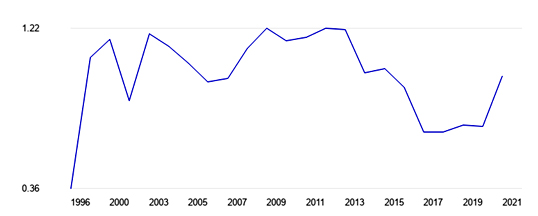
7. Oman
Although Oman has not participated in any military action against Israel since the occupation of Palestine, it has engaged in trade with it since 1994, and then meetings began between Omani and Israeli officials, the most prominent of which was the meeting of Sultan Qaboos bin Said with former Israeli Prime Minister Yitzhak Rabin in 1994, then with Israeli Prime Minister Netanyahu in 2018, and the two parties opened trade representation offices in 1996.[18] The Sultanate of Oman is the third country in the Arab world having political stability, but it is noticeable that this stability is clearly declining especially after 2003/2004, and it reached its lowest levels in 2011 and 2013, then returned to improvement between 2015 and 2017. However, it returned to decline until 2020, then improved slightly in the period 2021/2022. It does not seem in any way that the relationship with Israel has a negative or positive impact on Oman’s Political Stability Index, which means that the Israeli factor, like in the UAE case, did not improve political stability in Oman.
Chart 7: The Political Instability in Oman after Normalization
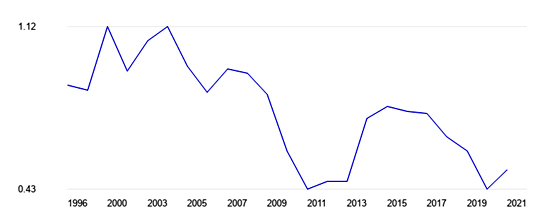
8. KSA
Normalization between Israel and KSA does not officially exist, rather it is still ambiguous. Its most prominent indicator are the opening of Saudi airspace (albeit with a degree of confusion and conflicting information) to Israeli civil aviation,[19] and allowing some Israeli media persons or athletes to enter KSA. Although the Arab Peace Initiative of KSA in 2002 implied Saudi willingness to accept Israel as a legitimate state in the region,[20] the latter’s rejection of the initiative did not give KSA room to develop their bilateral relations. It seems that other variables and not Israeli-Saudi relationship have impact on political stability in KSA.[21] The position on Israel may represent, especially in society and among elites, a contributing but not central factor of stability or its lack thereof, this is while noting that the Saudi society does not include a civil society in the political sense known worldwide.
The graph indicates that the decline of political stability, from positive to negative levels, began after the announcement of the Arab Peace Initiative in 2002, reaching its lowest, i.e., –0.65, then returned to improve without leaving the negative area since 2002 until now.
Chart 8: The Political Instability in KSA after Signs of Normalization
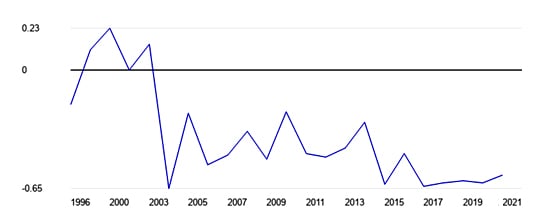
It seems that the succession crisis from 2015 (the appointment of Muhammad bin Salman as deputy crown prince, and the removal of both Prince Muqrin and Muhammad bin Nayef) until 2017 when bin Salman was appointed crown prince, explains the decline in political stability that appears in the graph. It is noticeable that 2017 is the lowest in Saudi political stability, and from that period until the end of 2022, KSA has remained among the unstable countries with an index of –0.58, and it is still currently among the least stable compared to previous periods. However, it is noticed that the relationship with Israel is not the determinant of these shifts in stability indexes; i.e., it has marginal effect on this index (compared to the internal indicators in the Saudi structure itself).
9. Bahrain
Bahraini-Israeli relations started with the exchange of official visits in 1994, then there were press reports on a series of secret meetings between senior Bahraini and Israeli officials during 2007–2009, and the exchange of official recognition and the opening of diplomatic missions in 2020–2021.[22]
There is a specific feature in the Bahraini society distinguishing it from the rest of the Gulf Cooperation Council (GCC) countries, where unofficial sources indicate that the majority of the population in Bahrain are Shiites.[23] This population has political organizations that are known for their opposition and hostility to any normalization with Israel.[24] The impact of these conditions on the stability in Bahrain is the clearest compared to other GCC countries, and this might also be responsible, to some extent, for part of the instability in KSA, where Shiites represent around 10–15% of the population.
Chart 9: The Political Instability in Bahrain after Normalization
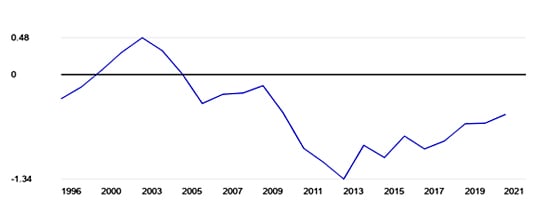
Second: Democracy Index[25]
Although the global Democracy Index reached 5.29 (on a 0-10 scale) in 2022,[26] the Democracy Index average in all Arab countries (20 countries) is 3.34. However, if we look at democracy in the normalization countries, we find the following:
1. The Democracy Index in the countries of normalization is lower than that of the rest of the Arab countries, as it reached 3.09 in the nine normalization countries, which is less than the Arab average by 0.25 points. This means that the Democracy Index of Arab normalization countries is lower than the average Arab level, which is already low compared to the rest of the world countries.
2. If we compare the countries of normalization on a historical basis, we find that the countries that are older in normalization (Egypt and Jordan) are the most backward in democracy, which means that involvement in normalization does not enhance the prospects of democracy in the region (see table 1). It is noted the number of normalization countries in which democracy has declined during the period 2012–2022 is six out of nine: Egypt, Jordan, Morocco, Oman and Bahrain, along with Sudan which is experiencing the worst period of its contemporary history; after the war between the Sudanese army and the Sudanese Rapid Support Forces where political life was disrupted in most of the state’s apparatuses.[27]
Table 1: Democracy Index in Normalization Countries 2012 and 2022
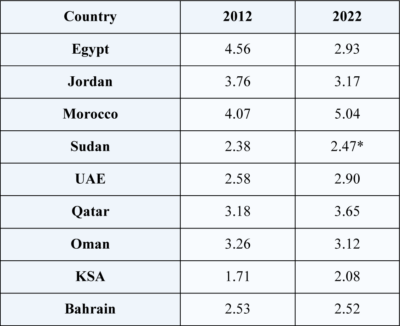
* Before the outbreak of the conflict between the army and the Rapid Support Forces.
Third: Military Expenditure as a % of GDP[28]
The world military expenditure as a % of GDP, decreased from 2.3% in 2013 to 2.2% in 2022. When examining the Arab military spending, we find the following:
1. Military expenditure as a % of GDP in the normalization countries reached about 4.03%, about 83% more than the world rate.
2. Military expenditure in four of the normalization countries increased during 2013/2014, but decreased in five of them, but the general rate for each of the two groups remains higher than the world average.
3. Calculating the average military expenditure of the GCC normalizing countries during 2014–2021, shows a decline from 6.61 in 2014 to 5.04 in 2021. It is noted that Qatar had the highest increase in military expenditure in that period, but remarkably, military expenditure of Gulf normalization countries remain more than double the world average.
Table 2: Military Expenditure as a % of GDP of Normalization Countries 2014–2021
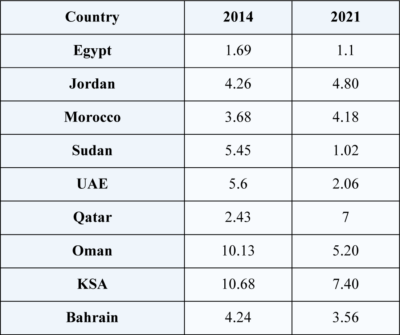
Fourth: R&D Expenditure Index[29]
Normalization with Israel has often been justified on the grounds that it allows scientific development and access to advanced technology by virtue of Israel’s links with industrialized countries. Although the world R&D expenditure (% of GDP) in 2021/2022 reached about 2.63%, that of normalizing countries reached 0.77%, i.e., only 29.27% of the world average. Indeed, the Arab ranking in research has decreased globally by an average of four ranks over the past two years, from 103rd to 107th, and in the field of innovation, the Arab average has declined by two ranks, from 81 to 83.[30]
Table 3: R&D Expenditure as a % of GDP
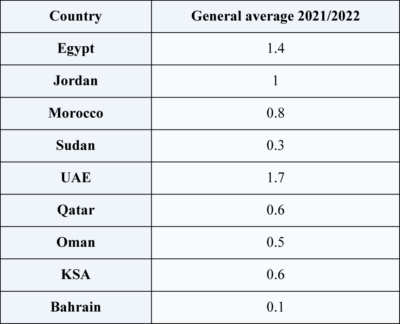
Analysis
International relations literature assumes that interests are the main, yet not the only, factor shaping international relations, but the main question is: Whose interest? In this matter, there are three parties supposed to benefit from that hoped-for interest which are the society (by achieving prosperity, stability and development in various dimensions), the state (by preserving its sovereignty, independence, territory, resources besides its international and regional standing) and the political system or regime (by maintaining power as a party or as a ruler to achieve his political vision or his own gain).
However, examining the decisions of the Arab countries to normalize relations with Israel reveals the following:
1. The quantitative measurement of four main indexes, with 57 sub-indicators covering various economic, political and social dimensions, showed that normalization did not enhance any of these indexes. The normalization countries, along with the rest of the Arab countries, are the worst globally, in terms of political stability, level of democracy, military expenditure and R&D expenditure, hence, it doesn’t achieve societal interests.
2. Depending on political distance to measure the levels of inter-Arab relations,[31] normalization has led to further tension in inter-Arab relations between its supporters and opponents, which contributes to strengthening instability and low levels of democracy. Indeed, inter-Arab trade has declined with the increase in normalization as intra-Arab commodity exports represented 18.6% of total Arab commodity exports to the world in 2021 compared to 20.7% in 2020 while in the field of imports it decreased from 18% in 2020 to 17.4 in 2021.[32]
3. Arab popular opposition to normalization, according to dozens of opinion polls, indicates a discrepancy between the orientations of political regimes and societies, which increases the gap between the two and enhances the possibilities of increasing instability.[33] It may even explain the increase of secret political organizations.
4. Normalization did not bring any gains or interests to societies or countries (previous indexes confirm this). It seems that the promises made by normalizers that normalization would lead to an improvement in the conditions of the Palestinians were not achieved in light of the successive operations witnessed at a higher rate than before normalization, just as settlement construction continued along with arrests, home demolitions and desecration of al-Aqsa Mosque. Indeed, the overall direction of the Israeli government embraced more extremism and right-wing tendencies, which contradicts all the justifications presented by normalizers.[34] Some regimes, such as Sudan, wanted to get their name removed from the US or Western sanctions list, or to receive more international aid which is often politically conditional aid, meaning that the security of Arab regimes takes precedence over any other societal interests or the sovereignty of the state, as shown by the indexes of this study.
The normalizing Arab political regimes have bartered normalization with Israel with US disregard for political tyranny in these countries (especially democracy, human rights, the issue of minorities, the formation of a civil society, women’s rights, media freedoms among others), which the US waves in the face of these regimes whenever they try to make their decisions independent of US influence.[35] Indeed, according to US think tanks, some Arab countries, such as KSA, have exploited the possibility of normalization and its expansion with Israel in return for the US turning a blind eye to “democracy and human rights” it usually exploits as a pretext to interfere in the policies of Arab political regimes.[36]
5. There is a psychological dimension that cannot be overlooked in the issue of normalization. Rather, it must be recalled that Sadat considered that “the psychological barrier between the Arabs and Israel constitutes 70% of the problem.”[37] Based on some provisions of the Arab-Israeli agreements, such as the Egyptian-Israeli treaty, normalization involves redefining the subjective political and social values, and redefining the identity of the self and the other for the parties to the conflict so that the enemy becomes a friend, the occupation legitimate, and displacement a sovereign matter that is not permissible to interfere with, while changing educational curricula and media discourse to be consistent with the new reality.
It seems that Ibn Khaldun’s saying that “The vanquished always wants to imitate the victor” means that the vanquished has feelings of inferiority towards the victor, for the West was the dominant in the Arab mind, and it was the owner of the prevailing language and the most scientifically developed, as well as the strongest economically and militarily, all of which perpetuate an inferior conception of the self among elites and leaders, especially in small countries or countries with a primitive or backward society. It is enough to review the political discourse of the leaders and their media outlets when a dispute arises between two Arab countries, and compare it to the discourse when a dispute arises with a major country, where the way Donald Trump dealt with some Gulf leaders is sufficient to prove this.[38]
Self-aggrandizement, by appearing next to “great leaders,” or appearing widely on the major international media and hearing words of veneration, contributes to creating an illusion in the subconscious that one is liberated from the inferiority complex, even at the expense of others.[39] It seems that normalization paved the way for some Arab leaders to widely appear and attend international intellectual forums, and for some to get rid of the deep feelings of inferiority, while feeding the denial complex concerning their people’s rejection of normalization decisions. This is largely consistent with Leon Festinger’s theory regarding “cognitive dissonance,” where cognitive trickery prevails to justify behavior not consistent with reality.[40]
Conclusion
1. Normalization did not provide any positive indicators for the Arab countries that adopted it, which quantitative measurements have confirmed for a long time and with a sufficient number of significative indexes.
2. The gap between society and the ruler in Arab countries widened due to the extent of popular opposition to normalization, hence negative results due to normalization tend to increase. This is seen in dozens of Arab public opinion polls, whether conducted by western or Arab pollsters.
3. Some Arab countries are normalizing their relations with other Arab countries that support the Palestinian resistance, to curb, as much as possible, the latter’s political and media criticism of normalization with Israel, especially in light of the increasing role and influence of social media.
4. The political distance, as shown by the indicators, increased between the Arab countries during normalization periods, manifested in the decline of the Arab League performance, the GCC disharmony, and the semi-paralysis of the Arab Maghreb Union, not to mention the widespread turmoil and mutual accusations among Arab countries.
5. Arab normalization with Israel is an application of appeasement diplomacy[41] which means making concessions to another party to ensure that hostility from that party does not continue, as happened with some European countries during the Nazi period. Data indicate, especially during President Trump’s term, that Arab normalization with Israel was to avoid US pressure regarding some internal political behavior in the Arab countries. Great gains are offered to the US in exchange for its support to the political regime to stay in power, which means that normalization does not serve the goals of the state or the society, as we have shown, but it is limited to the motives of the regimes.
[1] An expert in futures studies, a former professor in the Department of Political Science at Yarmouk University in Jordan and a holder of Ph.D. in Political Science from Cairo University. He is also a former member of the Board of Trustees of Al-Zaytoonah University of Jordan, Irbid National University, the National Center for Human Rights, the Board of Grievances and the Supreme Council of Media. He has authored 37 books, most of which are focused on future studies in both theoretical and practical terms, and published 120 research papers in peer-reviewed academic journals.
[2] There is a wide debate in the international relations literature about whether the normal state is peace or war. See the details of the dispute in this regard: Oliver P. Richmond, The Transformation of Peace (New York: Palgrave Macmillan.2005), pp.15–17 and 185–187.
[3] For more on these concepts, see Michael Howard, The Invention of Peace: Reflections on War and International Order (New Haven: Yale University Press, 2001), passim; and Johan Galtung, “A Structural Theory of Imperialism,” Journal of Peace Research, vol. 8, no. 2, 1971, pp.86–91 and 107–110.
[4] The Einstein-Freud Correspondence (1931–1932), site of Arizona State University, https://www.public.asu.edu/~jmlynch/273/documents/FreudEinstein.pdf
[5] J. David Kinzie and George A. Keepers (eds.), The Psychiatric Evaluation and Treatment of Refugees (Washington DC: American Psychiatric Association Publishing, 2020), pp.129-142 and 159-173.
[6] Timothy Webster, Recent attempts at reparations show that World War II is not over, site of The Conversation, 23/5/2019, https://theconversation.com/recent-attempts-at-reparations-show-that-world-war-ii-is-not-over-114655
[7] For an analysis of the concept of “normalization” based on the method of discourse analysis in postmodern studies, see Albzour Mai, “The Deconstruction of the Concept of Normalization within the Context of the Settler-Colonialism in Palestine: The Duality of Acceptance and Rejection,” Language, Discourse & Society journal, vol.7, no.2, December 2019, pp.7–17.
[8] For details, see the pages of each country in the general table of: Political Stability – Country rankings, site of TheGlobalEconomy.com, https://www.theglobaleconomy.com/rankings/wb_political_stability/accessed
[9] Ibid.
[10] William J. Linehan, “Models for the Measurement of Political Instability,” Political Methodology Journal, vol.3, no.4, 1976, pp. 444–449.
[11] List of Arab countries by population, site of Wikipedia, https://en.wikipedia.org/wiki/List_of_Arab_League_countries_by_population, See also the figures of the French National Institute for Demographic Studies in:What will the population of the Arab region be in 2050? (Arabic), site of arabi21, 14/1/2023, https://arabi21.com/story/1487682/
[12] I took this step from the standpoint of my responsibility… to protect the national security of Sudan and achieve the supreme interests of the Sudanese people, site of The New Arab, 5/2/2020, https://www.newarab.com/news/sudans-burhan-met-israel-pm-protect-national-security
[13] Lazar Berman, Israel in contact with Sudan’s leaders, trying to help calm fighting, official says, site of The Times of Israel, 20/4/2023,https://www.timesofisrael.com/israel-in-contact-with-sudans-leaders-trying-to-help-calm-fighting-official-says/
[14] Walid ‘Abd al-Hay, Sport Diplomacy: World Cup Qatar as an Example, site of al-Zaytouna Centre for Studies and Consultations, 3/1/2023, https://eng.alzaytouna.net/2023/01/03/academic-paper-sport-diplomacy-world-cup-qatar-as-an-example/
[15] Qatar and Israel: A Strategic but Complicated Alliance, site of fanack.com, 27/4/2013, https://fanack.com/politics/features-insights/qatar-and-israel-a-strategic-but-complicated-alliance~11005/
[16] Barak Ravid, Livni to Tell Gulf Leaders in Qatar: Iran the Threat, Not Israel, site of Haaretz, 14/4/2008, https://www.haaretz.com/2008-04-14/ty-article/livni-to-tell-gulf-leaders-in-qatar-iran-the-threat-not-israel/0000017f-dbb0-d3ff-a7ff-fbb066d70000; See Khalil Mabrouk, Launching a pact to confront media normalization with Israel (Arabic), site of Aljazeera.net, 12/1/2018, https://aja.me/egmbm
[17] Louay Y. Bahry, The New Arab Media Phenomenon: Qatar’s Al-Jazeera, site of Middle East Policy Council, https://mepc.org/journal/new-arab-media-phenomenon-qatars-al-jazeera
[18] Tovah Lazaroff, Netanyahu makes historic visit to Oman, site of Jerusalem Post newspaper, 26/10/2018, https://www.jpost.com/israel-news/netanyahu-makes-historic-visit-to-oman-570388; and Katie Paul, Oman says time to accept Israel in region, offers help for peace, site of Reuters News Agency, 27/10/2018, https://www.reuters.com/article/uk-bahrain-summit-oman/oman-says-time-to-accept-israel-in-region-offers-help-for-peace-idUKKCN1N10BF
[19] Kyle Blaine and Eliza Mackintosh, Saudi Arabia opens airspace to Israeli flights, site of Cable News Network (CNN), 15/7/2022, https://edition.cnn.com/2022/07/15/middleeast/saudi-arabia-israeli-airlines-airspace-biden-intl/index.html
[20] Yoel Guzansky, The Road to Normalization: Relations between Israel and Saudi Arabia, site of The Institute for National Security Studies (INSS), 23/7/2023, https://www.inss.org.il/publication/saudi-arabia-normalization/
[21] David Horovitz, Saudi Motives When Studying the Idea of Normalizing Relations with Israel, site of The Times of Israel, 24/7/2022, https://ar.timesofisrael.com/%d8%a7%d9%84%d8%af%d9%88%d8%a7%d9%81%d8%b9-%d8%a7%d9%84%d8%b3%d8%b9%d9%88%d8%af%d9%8a%d8%a9-%d8%b9%d9%86%d8%af-%d8%af%d8%b1%d8%a7%d8%b3%d8%a9-%d9%81%d9%83%d8%b1%d8%a9-%d8%aa%d8%b7%d8%a8%d9%8a%d8%b9 (Arabic); See also Times of Israel Staff, Efforts to establish relations with Saudi Arabia frozen as tensions with Palestinians escalate, The Times of Israel, 10/3/2023, https://ar.timesofisrael.com/%d8%a7%d9%84%d8%ac%d9%87%d9%88%d8%af-%d9%84%d8%a5%d9%82%d8%a7%d9%85%d8%a9-%d8%b9%d9%84%d8%a7%d9%82%d8%a7%d8%aa-%d9%85%d8%b9-%d8%a7%d9%84%d8%b3%d8%b9%d9%88%d8%af%d9%8a%d8%a9-%d9%85%d8%ac%d9%85%d8%af/ (Arabic); Jacob Magid, Diplomat: Saudi Arabia demanded US approval of a civilian nuclear program in exchange for normalization with Israel, The Times of Israel, 14/4/2023, https://ar.timesofisrael.com/%d9%84%d9%84%d8%aa%d8%b7%d8%a8%d9%8a%d8%b9-%d9%85%d8%b9-%d8%a5%d8%b3%d8%b1%d8%a7%d8%a6%d9%8a%d9%84%d8%8c-%d8%a7%d9%84%d8%b3%d8%b9%d9%88%d8%af%d9%8a%d9%88%d9%86-%d9%8a%d8%b1%d9%8a%d8%af%d9%88%d9%86/ (Arabic); and AFP and Times of Israel Staff, Saudi Arabia arrests Saudi citizen who helped Israeli journalist Gil Tamari illegally enter Mecca, The Times of Israel, 26/7/2022, https://ar.timesofisrael.com/%d8%a7%d9%84%d8%b3%d8%b9%d9%88%d8%af%d9%8a%d8%a9-%d8%aa%d8%b9%d8%aa%d9%82%d9%84-%d9%85%d9%88%d8%a7%d8%b7%d9%86%d8%a7-%d8%b3%d8%b9%d9%88%d8%af%d9%8a%d8%a7-%d8%b3%d8%a7%d8%b9%d8%af-%d8%a7%d9%84%d8%b5/ (Arabic)
[22] AP and Ramadan Al Sherbini, Bahrain minister calls for open communication with Israel, site of Gulf News, 27/6/2019, https://gulfnews.com/world/gulf/bahrain/bahrain-minister-calls-for-open-communication-with-israel-1.64872601; See also Bahraini royal decree establishing a diplomatic mission to Israel and appointing a head for it, site of The New Arab, 30/3/2021, https://www.alaraby.co.uk/politics/%D8%A7%D9%84%D8%A8%D8%AD%D8%B1%D9%8A%D9%86-%D8%AA%D8%B9%D9%84%D9%86-%D8%A5%D9%86%D8%B4%D8%A7%D8%A1-%D8%A8%D8%B9%D8%AB%D8%A9-%D8%AF%D8%A8%D9%84%D9%88%D9%85%D8%A7%D8%B3%D9%8A%D8%A9-%D9%84%D8%AF%D9%89-%D8%A5%D8%B3%D8%B1%D8%A7%D8%A6%D9%8A%D9%84-%D9%88%D8%AA%D8%B9%D9%8A%D9%86-%D8%B1%D8%A6%D9%8A%D8%B3%D8%A7%D9%8B-%D9%84%D9%87%D8%A7 (Arabic)
[23] Sunnis and Shia in the Middle East, site of British Broadcasting Corporation (BBC) News, 19/12/2013, https://www.bbc.com/news/world-middle-east-25434060; and Estimated Mapping the Global Muslim Population: Estimated Percentage Range of Shia by Country, site of Pew Research Center, 7/10/2009, https://www.pewresearch.org/wp-content/uploads/sites/7/2009/10/Shiarange.pdf
[24] Kenneth R. Rosen and David Pollock, Bahrain Poll Shows Split on Peace with Israel, But Sunni-Shia Divide Is Small, 23/12/2020, https://www.washingtoninstitute.org/policy-analysis/bahrain-poll-shows-split-peace-israel-sunni-shia-divide-small
[25] Democracy Index 2022: Frontline democracy and the battle for Ukraine, site of The Economist Intelligence, 2023, https://pages.eiu.com/rs/753-RIQ-438/images/DI-final-version-report.pdf; and The Economist Democracy Index, site of Wikipedia, https://en.wikipedia.org/wiki/The_Economist_Democracy_Index
[26] Democracy Index 2022: Frontline democracy and the battle for Ukraine, The Economist Intelligence, 2023, https://pages.eiu.com/rs/753-RIQ-438/images/DI-final-version-report.pdf
[27] Sudan, Freedom in the World 2023, site of Freedom House, https://freedomhouse.org/country/sudan/freedom-world/2023
[28]Trends in World Military Expenditure, 2022, SIPRI Fact Sheet, site of Stockholm International Peace Research Institute-SIPRI, April 2023, https://www.sipri.org/sites/default/files/2023-04/2304_fs_milex_2022.pdf; Military expenditure as percentage of gross domestic product (GDP) in highest spending countries 2022, site of Statista, https://www.statista.com/statistics/266892/military-expenditure-as-percentage-of-gdp-in-highest-spending-countries; Military spending, percent of GDP – Country rankings, TheGlobalEconomy.com, https://www.theglobaleconomy.com/rankings/mil_spend_gdp; Military expenditure as share of the gross domestic product in Egypt from 2010 to 2022, Statista, https://www.statista.com/statistics/1005201/egypt-military-expenditure-as-share-of-gdp; Military expenditure as share of the gross domestic product in the Middle East as of 2021, by selected countries, https://www.statista.com/statistics/1005166/middle-east-military-expenditure-share-of-gdp-by-country; United Arab Emirates – Country Commercial Guide, site of International Trade Administration, U.S. Department of Commerce, https://www.trade.gov/country-commercial-guides/united-arab-emirates-defense; and Military expenditure (% of GDP) – United Arab Emirates, site of The World Bank, https://data.worldbank.org/indicator/MS.MIL.XPND.GD.ZS?locations=AE
[29] List of sovereign states by research and development spending, Wikipedia, https://en.wikipedia.org/wiki/List_of_sovereign_states_by_research_and_development_spending#cite_note-2; see also globally, Research and development expenditure (% of GDP), The World Bank, https://data.worldbank.org/indicator/GB.XPD.RSDV.GD.ZS; and Policy Paper: The “World Creativity & Innovation Day”: The Underlying Challenge Facing Jordan, site of The Jordan Strategy Forum (JSF), April 2023, p. 13.
[30] 2023 Annual Report, The Arab Investment and Export Credit Guarantee Corporation (Dhaman), Kuwait, 2023, pp. 41–45.
[31] See the details of this methodology which gave accurate results when applied to measure levels of friendship and enmity between countries over a decade: Frank L. Klingberg, “Studies in measurement of the relations among sovereign states,” Psychometrika journal, no. 6, 1941, pp. 335–352.
[32] Dhaman al-Istismar (Investment Guarantee) Quarterly Bulletin, The Arab Investment and Export Credit Guarantee Corporation, Bulletin 2, April–June 2022, pp. 22–23, https://www.dhaman.net/en/economic-publications/#economic-list-cat
[33] Dylan Kassin and David Pollock, Arab Public Opinion on Arab-Israeli Normalization and Abraham Accords, The Washington Institute for Near East Policy, 15/7/2022, https://www.washingtoninstitute.org/policy-analysis/arab-public-opinion-arab-israeli-normalization-and-abraham-accords
[34] See details about the justifications for normalization by officials in the countries of normalization, The costs and benefits of Arab-Israeli normalization on Abraham Accords’ two-year anniversary, site of Arab News, 21/5/2023, https://www.arabnews.com/node/2163976/middle-east
[35] Site of Le Monde, https://www.lemonde.fr/en/international/article/2022/06/06/the-unpredictability-of-arab-normalization-with-israel_5985803_4.html
[36] Robert Satloff, Saudi Normalization with Israel, Domestic ‘Transformation,’ and U.S. Policy, The Washington Institute for Near East Policy, 1/5/2023, https://www.washingtoninstitute.org/policy-analysis/saudi-normalization-israel-domestic-transformation-and-us-policy
[37] See the full text of the speech at: 73: Statement to the Knesset by President Sadat, 20 November 1977, site of gov.il: Ministry of Foreign Affair, 20/11/2002, https://www.gov.il/en/Departments/General/73-statement-to-the-knesset-by-president-sadat-20-november-1977
[38] Trump: I told Saudi king he wouldn’t last without U.S. support, Reuters, 3/10/2018, https://www.reuters.com/article/us-usa-trump-saudi-idUSKCN1MD066
[39] David Thomas, Narcissism: Behind the Mask (UK: The Book Guild, 2010), chap. 2.
[40] Saul Mcleod, What Is Cognitive Dissonance? Definition And Examples, site of Simply Psychology, 15/6/2023, https://www.simplypsychology.org/cognitive-dissonance.html
[41] Steve Hendrix, Inside the secret-not-secret courtship between Israel and the United Arab Emirates, 14/8/2020, site of The Washington Post newspaper, https://www.washingtonpost.com/world/middle_east/inside-the-secret-not-secret-courtship-between-israel-and-the-united-arab-emirates/2020/08/14/3881d408-de26-11ea-b4f1-25b762cdbbf4_story.html; and on the concept, see Jacques Neriah, The Munich Agreement: Lessons for the Future, site of Jerusalem Center for Public Affairs, 5/9/2018, https://jcpa.org/video/the-munich-agreement-lessons-for-the-future-jacques-neriah
| Click here to download: >>Academic Paper: The Motives for Arab Normalization with Israel from the Perspective of the Society, the State and the Political System … Prof. Dr. Walid ‘Abd al-Hay |




Leave A Comment